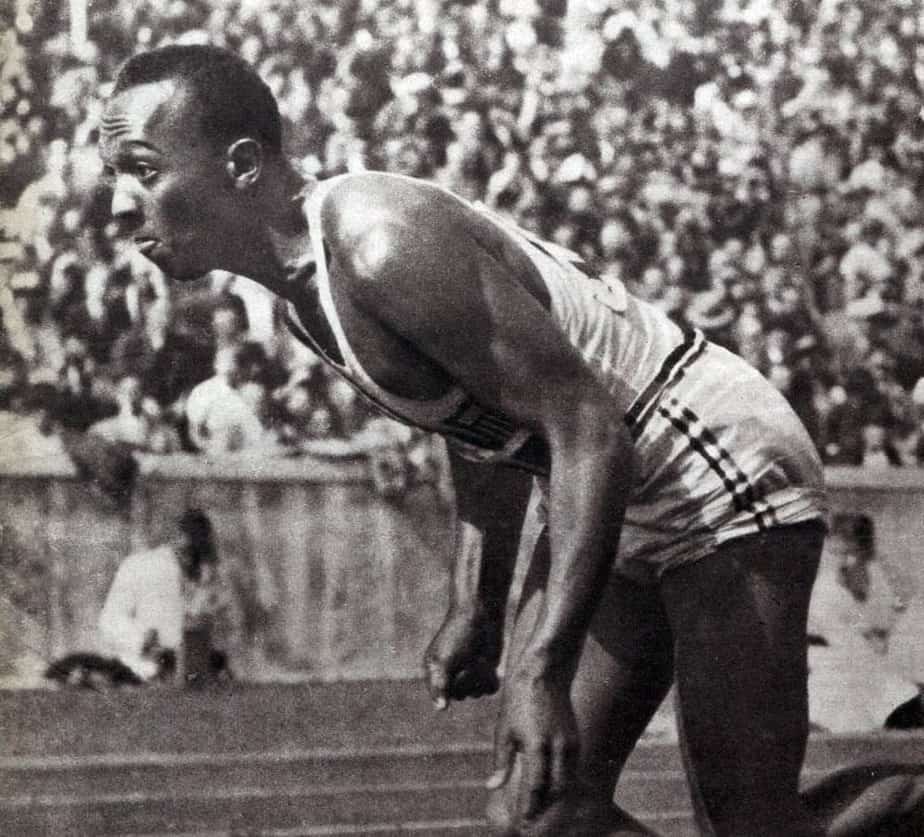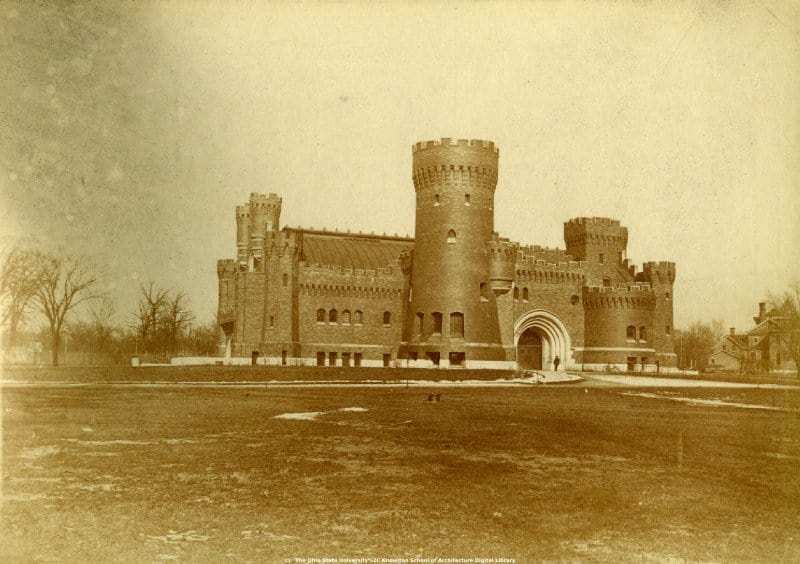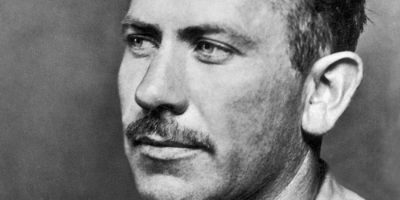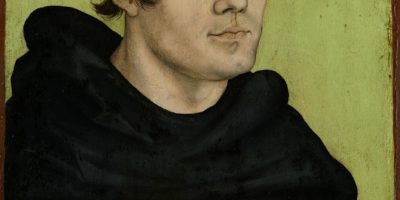20 Amazing Facts about Jesse Owens
*Originally published by Cyndi K on March 2022 and Updated by Vanessa R on May 2023. Updated by Charity K on January 2024.

Jesse Owens Card- Author; Unknown author- Wikimedia
Jesse Owens, full name James Cleveland Owens was born on September 12th, 1913 in Oakville, Alabama. He was an American track and field athlete who set a world record in the high jump. The name “Jesse” stuck after a teacher mispronounced the name he gave, “JC.”
He was well known for his extreme talent in athletics. He passed on March 31st, 1980 at the age of 66 due to lung cancer.
1. Jesse Owens First became a National sensation while in high school
Owens came to national attention when he was a high school student in Cleaveland. At the 1933 National High School Championship in Chicago, he equaled the world record at the time of 9.4 seconds in the 100-yard (99 meters) dash and long jumped 24 feet, 9.5 inches.
2. He set a record in the long jump

Owens doing a jump-Author, National Archives- Wikimedia
Jesse Owens set a world record in the long jump that stood for 25 years straight without being broken. In 1935, the year before the Berlin Olympics, he gave a leap of 8.13 meters (26 feet, 8 inches).
This record was broken 25 years later in 1960 by Ralph Boston. This was in Ann Arbor City Michigan at the Big Ten track meet.
He was able to set three world records all in less than an hour and thus ended up being termed as “the greatest 45 minutes ever in sports.”
3. Jesse Owens won 4 gold medals in the 1936 Olympics

Jesse Owens during the 1936 Berlin Olympics- Author; Le Miroir des sports- Wikimedia
Jesse achieved international fame in 1936 at the Summer Olympics in Berlin, Germany by winning 4 gold medals. These were in: 100 meters, long jump, 200 meters, and 4 x 100-meter relay. He became the most successful athlete in those games.
4. He was ranked 6th greatest North American Athlete of the 20th century

Owens ready to sprint-Author; Associated Press- Wikimedia
Owens was ranked as the 6th greatest North American athlete of the 20th century by ESPN. He was the highest-ranked in this sport. In 1999, he was listed on the six-man shortlist for the BBC Sports Personality of the Century.
5. Was the first black man to be captain of an Ohio State Varsity team

Ohio State University in 1899- Author; Ohio State University-Wikimedia
After becoming a track and field star at a Cleveland high school, Owens enrolled at the Ohio State University.
Because of always breaking records and setting bars high for the Ohio State University Buckeyes track team, Owens came to be known as the “Buckeye Bullet.”
Consequently, he was elected captain of the Ohio State varsity team. He became the first black man to have that position.
He was however barred from living in an on-campus dorm due to him being black.
6. Jesse Owens was persuaded by the Adidas shoe founder to wear handmade shoes

Jesse Owens in 1936 Olympics with the pair of shoes given by Adi Dassler- Wikimedia
In 1936, just before the competitions, the founder of Adidas athletic shoes, Adi Dassler, visited Owens and persuaded him to wear his personally handcrafted leather track shoes.
It was a unique pair of shoes as it was a handcrafted leather shoe with extra-long spikes. This was the first sponsorship seen that included an African American athlete.
Owen’s triumph played a role in helping launch his business. A decade later, Dassler started his own company, Adidas.
7. Awarded the Congressional Gold medal

Jesse Owens Congressional Gold Medal- Author; US Mint- Wikimedia
In 1990, Jesse Owens was posthumously awarded the Congressional Gold Medal by President George H. W. Bush.
This was to honor his success in the 1936 Berlin Olympics and to acknowledge the fact that at the time, racial discrimination was at its peak and thus he didn’t get the recognition he deserved
8. Jesse Owens formed an all-black baseball league
In 1946, Jesse Owens joined Abe Saperstein in forming a baseball league by the name of, the West Coast Negro Baseball League (WCNBA).
It was also a new negro baseball league. At the time, these were America’s professional baseball leagues comprising African Americans and to a small extent, Latin Americans.
At a time when racial discrimination was too much, the league gave members of the minority an opportunity to participate in sports.
Owens became the vice president of WCNBA and the owner of the Portland Rosebuds. They were a baseball league and Owens toured with them.
Sometimes, they would entertain the audience in between the game, by competing in races against horses. WCNBA was however disbanded after only 2 months.
9. Was enlisted as a goodwill ambassador
In 1955, Republican president, Dwight Eisenhower enlisted Owens as a goodwill ambassador.
Due to this, he was sent to India and the Philippines to promote physical exercise and amateur sports as well as advocate for the cause of American freedom and economic opportunity in the developing world.
He continued his goodwill tours in the 1960s and 1970s.
10. Was Awarded the medal of freedom

Jesse Owens during the 1976 Ceremony- Author; Unknown- Wikimedia
In 1976, Owens received national recognition for his achievements. President Gerald Ford awarded him with the Medal of Freedom which is the highest civilian honor a president can bestow.
This was during a ceremony held in August 1976 and was attended by the 1976 U.S. Summer Olympic team.

American track star Jesse Owens shakes hands with Italian competitor Ercola Gallegati at the Olympic Village in Berlin, 1936. (AP Photo)- Wikimedia
Jesse Owens did his country proud during the 1936 Berlin Olympics and is still celebrated today.
11. Jesse Owens was Nicknamed “J.C”
When he was younger, Jesse’s family gave him the nickname “J.C.” However, his first day at school led to him being called “Jesse” When he was at Ohio State University, he was given the nickname Buckeye Bullet. It came from his incredible speed and explosive performance that earned him the comparison to a speeding bullet.
12. He Survived DIY Surgery with a Kitchen Knife

Acme News Photos, Public domain, via Wikimedia Commons
At the age of five, Jesse developed a painful tumor on his chest. However, his mother wasn’t able to afford a doctor. So his mother performed a makeshift surgery with a sterilized kitchen knife and pliers. She was able to remove the growth and save his life. The experience undoubtedly instilled in him a resilience and determination that carried him through challenges.
13. Jesse worked Odd Jobs to support His Family
Even though he has Olympic achievements, he was still faced with financial difficulties throughout his life. Some of the jobs he did include pumping gas at a gas station, working as a stock boy at a department store, operating an elevator, serving as a playground director, and endorsing products. The jobs were not glamorous but they helped Jesse provide for his family and maintain his athletic training.
14. He almost became a Teacher

Los Angeles Daily News, Public domain, via Wikimedia Commons
Although he was destined for athletic greatness. Jesse Owens always shared his dream of becoming a teacher. The dream was inspired by his own influential educators. However, due to financial struggles, he was forced to focus on his athletic dreams.
15. Jesse Owens has other Business Ventures
Even though he was a successful athlete, Jesse didn’t have a lot of privilege compared to his competitors. Instead, he relied on endorsement deals such as promoting shoes, gasoline, and cigarettes. He also appeared in advertisements for the sporting goods company Spalding. Jesse also started his businesses such as a dry-cleaning service, and a public relations firm. He faced a lot of financial struggles with some of his ventures but others were successful. When the businesses peaked, he invested in a restaurant and a bowling alley.
16. He was a Civil Rights Activist
When Jesse came back to the United States after competing in the Berlin Olympics, he dedicated time and resources to advocating for social justice. He even participated in marches and protests for civil rights including the 1963 March on Washington. He was known for using sports as a platform to promote social justice. Jesse would participate in exhibition tours around the world advocating for sportsmanship while also breaking down racial and cultural barriers.
17. Jesse appeared in a 1936 Film

Photo by De’Andre Bush on Unsplash
He had a brief appearance in the anti-marijuana propaganda film “Reefer Madness” In the film, Jesse played a character who warns against the dangers of drug use. His role in the film highlighted Jesse’s genuine concern for the well-being of young people as well as his belief that marihuana was harmful. His cameo in the film is a unique part of his career that shows his willingness to use his platform to promote a positive message. He was also able to raise a fan base in Hollywood.
18. He was an Ambassador for Peace
After the war, Jesse participated in goodwill missions and cultural exchange programs. He also used his platform to advocate for social justice and racial equality. Jesse believed that sports had the power to transcend political and social barriers. He engaged in dialogue, challenged prejudices, and inspired others to work towards a more just and harmonious world.
19. He is an Inspiration to Young Athletes
Jesse Owens serves as a powerful inspiration for young athletes. He is a role model who overcame adversity and financial struggles. However, he never gave up on his dream and was able to make a difference in the sports world. Jesse demonstrated the importance of mental strength and resilience.
20. Jesse Owens has a Legacy Beyond Sports

Nick Number, CC BY 4.0, via Wikimedia Commons
His impact on society is a powerful reminder that hard work and determination can overcome adversity as well as pave the way for positive change. He was a champion for social justice, an advocate for equality, and a symbol of hope and resilience. His legacy continues to inspire individuals around the world.
3 Little Known Facts about Jesse Owens
1. He felt ignored by President Franklin D. Roosevelt and not by Hitler

Rich Bowen from Lexington, KY, USA, CC BY 2.0, via Wikimedia Commons
A rumor that Hitler was offended by Owens’ victory and refused to congratulate him or shake his hand spread quickly after the Berlin Games. The Olympic champion received a “nice little Nazi salute” from the German leader, according to a reporter covering the Games. According to Owens, they waved each other congratulations. He went on to say that the actual offense had been caused by President Franklin D. Roosevelt, who had refused to invite any Olympic athletes to the White House after the Games.
2. He performed degrading stunt races to make ends meet
The Olympic champion returned to Jim Crow America and discovered his options for a career were restricted despite his global fame following the Berlin Games. For financial gain, Owens started competing in stunt races. In Cuba, he had to compete with dogs, trains, cars, motorcycles, and even a racehorse.
3. Every day, Owens smoked one pack of cigarettes
Unexpectedly, the professional athlete had smoked for years. He smoked while appearing on All-American News in the 1950s, the first newsreel program made for African viewers. At the conclusion of a segment on Black athletes, Owens lit a cigarette for himself and another for the host, businessman, and writer Claude Barnett. Owens was smoking Chesterfields, which he was advertising. Owens passed away from lung cancer on March 31, 1980,
Planning a trip to Paris ? Get ready !
These are Amazon’s best-selling travel products that you may need for coming to Paris.
Bookstore
- The best travel book : Rick Steves – Paris 2023 – Learn more here
- Fodor’s Paris 2024 – Learn more here
Travel Gear
- Venture Pal Lightweight Backpack – Learn more here
- Samsonite Winfield 2 28″ Luggage – Learn more here
- Swig Savvy’s Stainless Steel Insulated Water Bottle – Learn more here
Check Amazon’s best-seller list for the most popular travel accessories. We sometimes read this list just to find out what new travel products people are buying.










